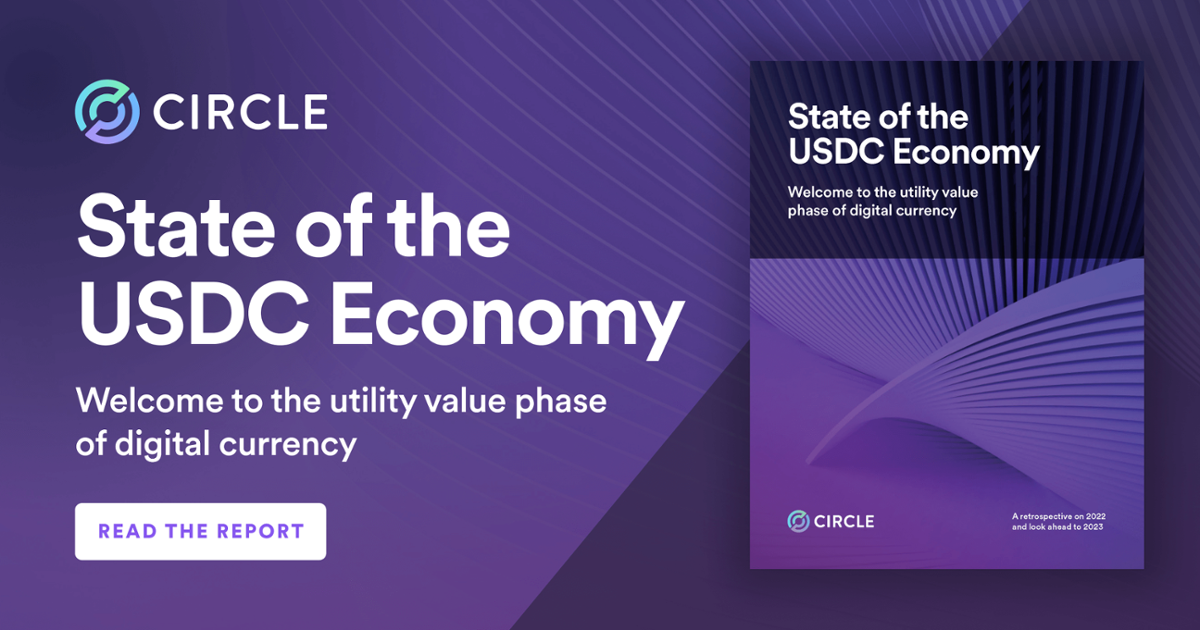Learn more about Circle Impact and how we’re advancing financial inclusion through technology and education in our State of the USDC Economy report.

As we pursue our company mission of increasing economic prosperity through the frictionless exchange of value, Circle is also focused on increasing financial inclusion by delivering new technologies, supporting financial literacy and taking action on disaster relief initiatives. We’re taking a closer look at the State of the USDC Economy Report distributed at this year’s World Economic Forum in Davos by highlighting the ways we’re helping build a more inclusive financial system.
In November 2021, we established Circle Impact to act as an accelerant of a core company objective – position the accessibility and speed of internet-powered financial innovation to people and communities too often left behind by the traditional financial system.
Now, more than a year later, we are able to take stock of the diverse efforts we have advanced as part of this central objective and in support of Circle’s mission. In recapping our work across Circle Impact’s three pillars – cultivating financial inclusion, driving digital financial literacy, and powering humanitarian aid, disaster relief and charitable giving – we are proud of the change we have enabled, and seek to activate even greater impact in the year ahead through new initiatives and partnerships.
Cultivating financial inclusion
The world is an abundant place, but resources and opportunities have not always been equitably distributed.
In our initial Circle Impact announcement in November, 2021, Circle pledged to allocate a share of USDC dollar-denominated reserves to Minority-owned Depository Institutions (MDIs) and Community Banks across the U.S. These institutions are critical to the economic vitality and financial wellbeing of low-income and underserved individuals, families, and small businesses, as well as the communities they serve. In many cases, MDIs provide people with loans to buy their first homes, capital to fund new businesses, and emergency funds. By placing a share of USDC reserves in MDIs and Community Banks, we hope to strengthen the balance sheets of these vital institutions, thereby strengthening the communities they serve.
Since making this pledge, we have allocated more than $1 billion USDC reserves in MDIs and Community Banks. Our partnerships with these institutions extend beyond the custody of USDC reserves as we engage communities and partner on broader efforts related to financial inclusion and digital financial literacy. These efforts enable us to invest in community-based initiatives to promote access to low-cost financial solutions for underserved and unbanked communities while introducing new forms of financial technology and innovation.
We are also proud to support founders and entrepreneurs from historically underrepresented communities through the Community Pitch Competition. This initiative – spearheaded in collaboration with other industry participants – offered capital, networking, and business building tools to high-impact early stage companies, showcasing the next generation of diverse business leaders.
Driving digital financial literacy
Digital assets are a key part to unlocking a long-overdue transformation in commerce, but limited access and lack of digital financial literacy has created as many challenges as it has opportunities. The promise of wealth creation and the democratization of finance cannot be achieved unless people are equipped with the tools and information they need to make informed decisions about how best to engage with financial technology. As a company, we have the opportunity to actively drive digital financial literacy and have collaborated to advance these efforts with a range of institutions.
In 2022, we launched Circle U, a repository of financial technology knowledge, providing an introduction to blockchain-based financial services. The curriculum, which began as an internal tool to educate Circle employees, has since been adapted and expanded as a resource for partners new to digital assets and blockchain. It covers topics ranging from the evolution of money, digital assets, and blockchain technology, to deep-dives on different technology protocol and market issues.
As we began a public rollout of Circle U, Circle partnered with four Historically Black Colleges and Universities (HBCUs) and one Hispanic Serving Institution (HSI) to share this curriculum with students, educating a rising generation of leaders. Students who successfully complete the Circle U curriculum are eligible for pipeline opportunities with Circle. Circle also partnered with Bowie State University and Rhodes Business School (RBS) in South Africa, focusing on digital financial literacy. In Fall of 2022, RBS students traveled to Washington, D.C. for an exchange program, including an intimate salon with Circle’s CEO, Jeremy Allaire, and Chief Strategy Officer and Head of Global Policy, Dante Disparte.
Powering humanitarian aid, disaster relief, and charitable giving
Circle Impact has been facilitating aid, development, and humanitarian interventions worldwide, spurring public-private partnerships to mobilize faster, corruption-resistant payments using USD Coin (USDC). With digital dollars riding on open, public blockchains, organizations can better track payments and ensure they go directly to intended recipients. These tools make donations more reliable, efficient, and inexpensive.
We are currently working with leading humanitarian organizations to set up disbursement mechanisms to support those in great need. In December 2022, we were proud to announce blockchain-based aid programs with UNHCR, the U.N.’s refugee agency, as well as International Rescue Committee (IRC), in support of internally-displaced persons in Ukraine. Through this initiative – and in partnership with the Stellar Development Foundation and MoneyGram – UNHCR and IRC will transfer USDC to aid recipients’ digital wallets, which can be safely stored while traveling. As needed, USDC can be cashed out in a variety of currencies at 4,500 locations across Ukraine.
Additional details on Circle Impact initiatives and much more can be found in the State of the USDC Economy Report. Download the report now to see what we’ve been working on and for insights into what’s in store as the USDC economy continues to grow.






